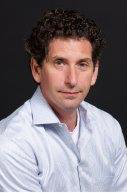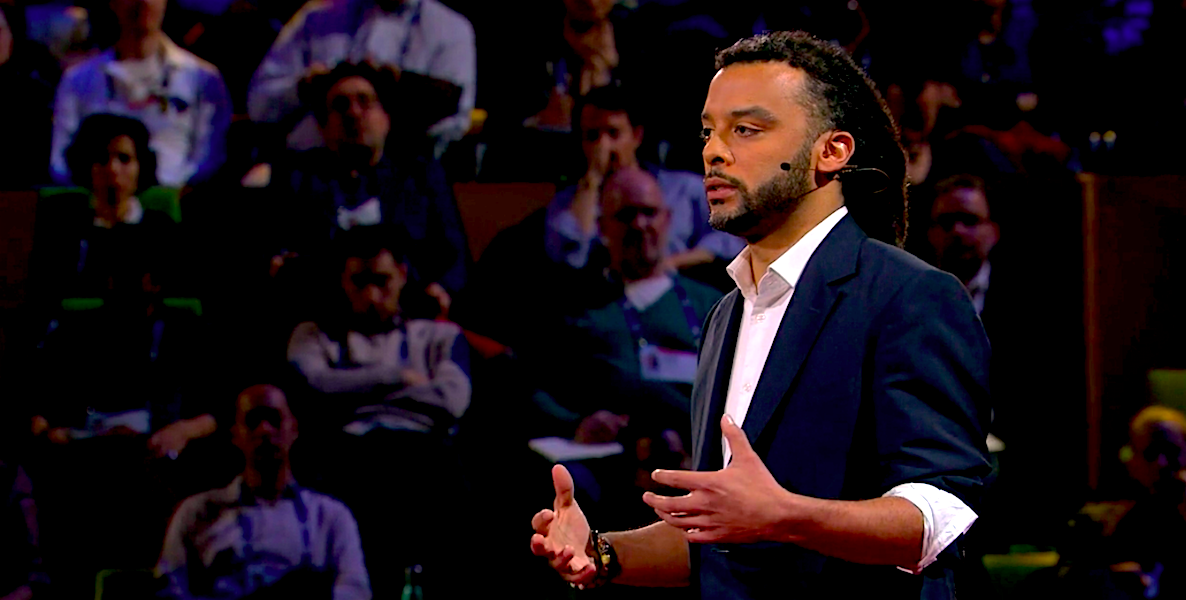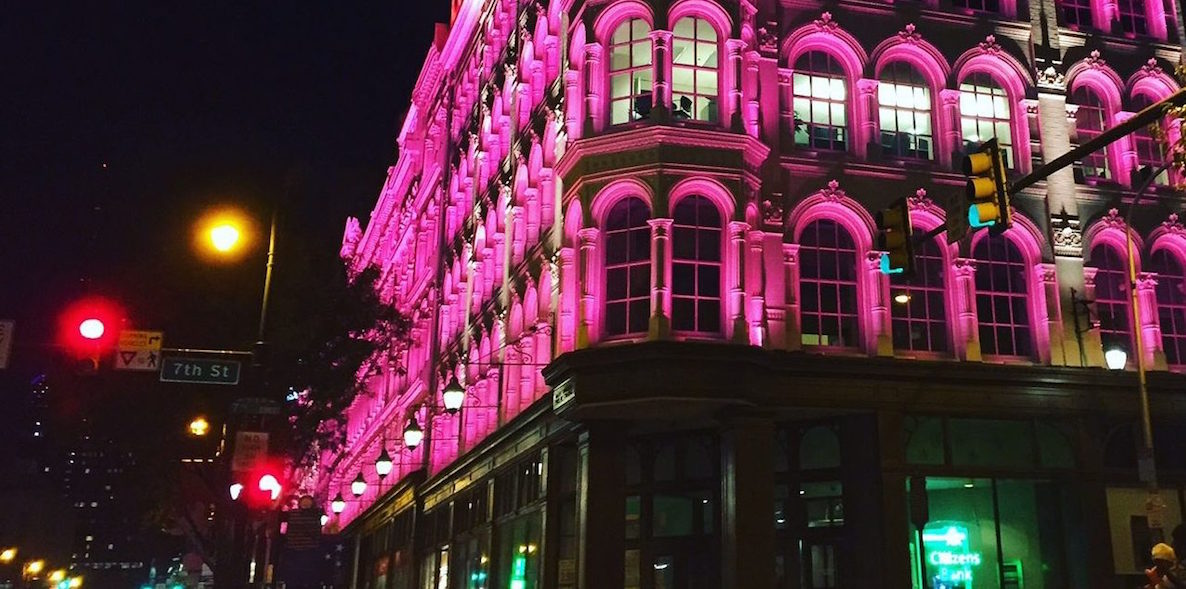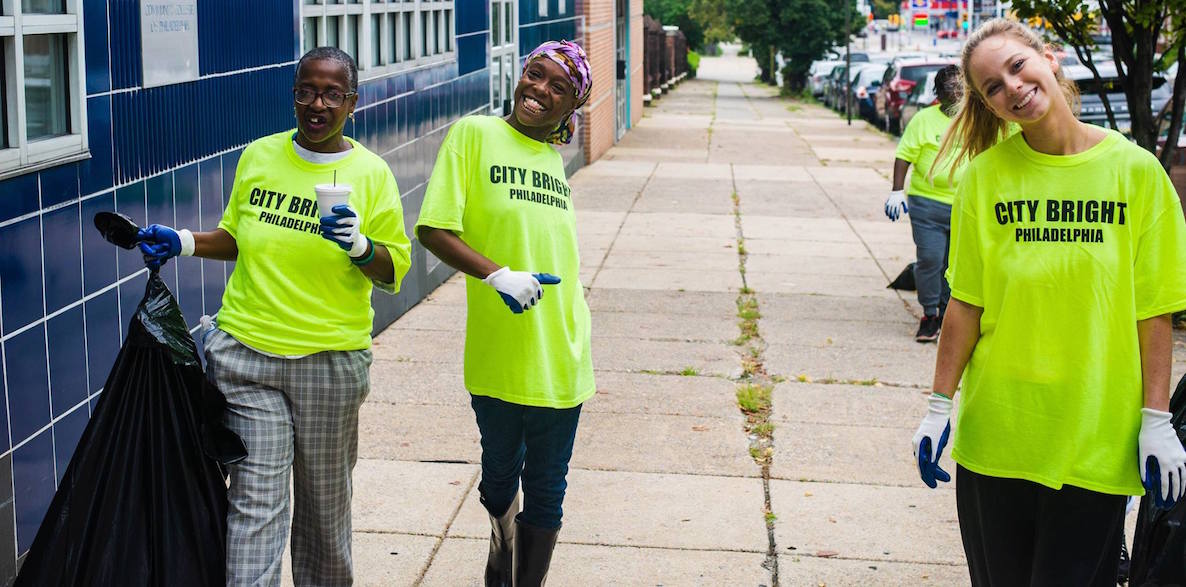For the last 20 or so years, since Adam Kesselman has been commuting to Philly for his work in the pharmaceutical and health industries, he has made it a goal to pick up at least one piece of trash from the city sidewalks. It is, as anyone who’s ever walked around Philly knows, an easy goal to meet. Still, it is, Kesselman admits, an obsession that not everyone shares. “People who’ve worked with me think I’m crazy,” says Kesselman, who lives in Lafayette Hill. “But I hate litter.”
In recent years, Kesselman has also found himself confounded by another chronic Philadelphia concern: Homelessness. Now, he’s trying to put a dent in both problems with one solution: Last summer, he launched City Bright, which pays homeless people each Saturday morning to clean up trash in a Philadelphia neighborhood. So far, Kesselman has led 10 cleanups, yielding 6,000 pounds of trash, with 200 different men and women from shelters in the city, each of whom earns $20 for 2.5 hours of work.

“The goal is not to have hordes and hordes of homeless people clean the city,” Kesselman says. “The goal is to have City Bright help them get jobs. I write a letter of recommendation for anyone who comes back more than twice, which they can use for a reference in any way they want.”
Kessleman’s experience with organized cleanups dates back about 15 years, to when his son was six years old. One day, as they were driving out of the city, Max asked his dad why the streets were so dirty. Kessleman’s answer—sometimes people don’t clean up, or don’t have the resources to take care of it—prompted his son to suggest writing to the President to ask him to do something about it. Instead, Kesselman suggested they turn Max’s interest local. They launched Max’s Mission in Lafayette Hill, which organized regular trash pickups with children in and around their community, often around Max’s birthday.
“The goal is not to have hordes and hordes of homeless people clean the city,” Kesselman says. “The goal is to have City Bright help them get jobs. I write a letter of recommendation for anyone who comes back more than twice, which they can use for a reference in any way they want.”
City Bright is an extension of that idea, in the city where Kesselman works—currently at Health Union, a company that builds digital communities for people with chronic diseases—and plays. Several months ago, in doing some research online, Kesselman came across a shelter in Fort Worth that pays its residents to pick up trash. He called the shelter manager to find out the details. Then—because he’s a “classically-trained marketing guy” with an MBA from Wharton—he wrote a business plan, and decided to try it on his own. “I figured, I had an idea, I’d test it, if it fails, I’d move on,” he says.
![]()
For his trial run, in July, Kesselman printed flyers and walked through Center City, handing them out to panhandlers and at a shelter at 12th and Race streets. He showed up that Saturday morning with gloves, trash bags and a pocket of cash, expecting maybe a few people or none at all would meet him there. Instead, 25 homeless men, mostly from the shelter, were waiting for him.
The next week, he went back to 12th and Race. This time, 75 people were waiting for him, some of whom had been there since 5 a.m. (Kesselman, who hadn’t brought enough money, had to turn some away; now he sends sign-up sheets to the shelter beforehand.) “They worked hard, in the middle of July, when it was 90 degrees by 10 a.m.,” Kesselman says. “They are out there, picking up trash, dirty diapers, undesirable things. They want to make a little money and contribute to the community.”
Kesselman has done 10 Saturday morning cleanups near four shelters—Guadenzia in West Philly; Progress Haven in North Philly; Sunday Breakfast in Chinatown; and St. John’s Hospice at 12th and Race. Each cleanup costs about $1,000—most of it in payment to around 40 people each; the rest in gloves, bags, water and brightly-colored t-shirts for safety. Early on (at the advice of the Ft. Worth shelter manager) he reached out to the Streets Department, which agreed to pick up the full bags within 24 hours of collection. He aims to do one cleanup every Saturday for the next 52 weeks.
So far, Kesselman has led 10 cleanups, yielding 6,000 pounds of trash, with 200 different men and women from shelters in the city, each of whom earns $20 for 2.5 hours of work.
So far, Kesselman has spent $5,000 of his own money, and raised another $9,000 from friends and other donors (including $1,000 from Councilman Allan Domb). He has a Go Fund Me page to collect donations for the year, and has applied for nonprofit status, so all donations will be tax-deductible.
Kesselman does not think City Bright is the answer to the huge problems of homelessness or litter. And he has had to face the perception that he is a (relatively) rich white guy from the suburbs paying poor (mostly brown) homeless people to clean up litter. Sure, but Kesselman is motivated to solve problems he sees in his world, in a way that he can. And so far, it seems to benefit many: $20 is not a game changer, but it helps with the sort of basics—like toiletries and socks—it’s often hard to afford when homeless; a letter of recommendation can be a needed step to getting a job or apartment; neighbors who may be unhappy about a shelter in their community get cleaner streets; shelter managers have a program they can direct their residents to.
![]()
Similar programs to City Bright already exist around the country. Besides Ft. Worth, there are pilots in Los Angeles, Bangor, Maine, and Albuquerque, New Mexico, where the Mayor initiated a program to invite panhandlers to clean up empty lots, get paid and then get dropped off at a services center where they can address needs like housing, and mental health services. In Philly, Kesselman says he has had the most luck recruiting people from shelters—in part because Center City panhandlers make enough money that they don’t need his $20, and in part because folks living in shelters have already taken one step towards coming in off the street.
Of course, this raises the perennial question in any conversation about litter in Philadelphia: Why should trash pickup be the responsibility of individuals like Kesselman or the folks he hires? (Or any of a number of people we’ve talked about in The Citizen.) That the Streets Department has readily agreed to send trucks to collect the trash bags is great, but why isn’t the city sending trucks to do street cleaning, as Mayor Kenney promised? Why aren’t there just more places to put trash as we walk down the street?
Kesselman looks at the problem of trash in Philadelphia with a reasoned view, something that stands out all the more for having traveled all around the world. He points to structural problems: Lack of trash cans. And he points to American culture, which unlike in Japan or Scandinavia, for example, does not have a long history of keeping streets clean. “It’s not just in Philly,” he says. “We’re one of the worst countries in the world. There shouldn’t be trash on our highways or parks or anywhere.”
Until there isn’t, and until we as a culture and we as a city have learned to do better, there is Kesselman and City Bright, for as long as he can keep it going. “I have one kid in college, and another going,” he says. “I don’t have an infinite amount of money to do this. I’ll do what I can based on the money I have and can raise. Hopefully it will be enough to keep it going.”
Photo via GoFundMe






